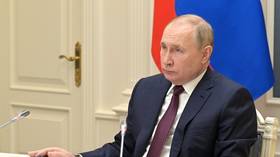US claims Russia is ‘manufacturing threats’
White House press secretary Jen Psaki insists NATO poses no threat to Russia

White House press secretary Jen Psaki said on Sunday that Russian President Vladimir Putin’s decision to place Russia’s nuclear deterrence forces on high alert was an example of “manufacturing threats that don't exist.” Putin, however, says he gave the order after NATO officials made “aggressive statements” against Russia.
“This is really a pattern that we've seen from President Putin through the course of this conflict, which is manufacturing threats that don't exist in order to justify further aggression,” Psaki told ABC News anchor George Stephanopoulos. “And the global community and the American people should look at it through that prism.”
Shortly before Psaki spoke, Putin ordered Russia’s deterrent forces – which include various strategic weapons, both nuclear and conventional – placed on “special” alert. Putin said that he made the decision based on “aggressive statements against our country” from NATO countries. He also denounced sanctions imposed by the West as “illegitimate.”
NATO’s response to Russia’s military offensive has involved stepping up arms deliveries to Ukraine, while the US and its European allies imposed economic sanctions on Moscow, including expelling some Russian banks from the global SWIFT network.
“At no point has Russia been under threat from NATO, has Russia been under threat from Ukraine. This is all a pattern from President Putin,” Psaki added.
Shortly afterwards, NATO Secretary General Jens Stoltenberg told CNN that NATO – which was formed during the Cold War with the explicit goal of countering the Soviet Union – does not see Russia as an “imminent threat.” Nevertheless, Stoltenberg insisted that the alliance remains open to the idea of Ukrainian membership, something Russia has consistently opposed.
While Psaki insisted that NATO does not pose a threat to Russia, Moscow sees things differently. Russia has been opposing the alliance’s expansion into the former states of the Warsaw Pact, something their Western counterparts promised not to do at the close of the Cold War but did regardless.
Throughout negotiations leading up to the conflict in Ukraine, as the West refused to rule out NATO membership for Kiev, Russia repeatedly stated that the alliance’s weapons on its borders would constitute an unacceptable security threat.

0 Comments:
Post a Comment
Subscribe to Post Comments [Atom]
<< Home